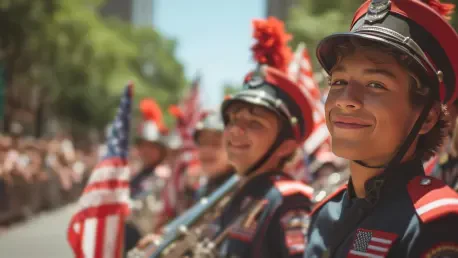In today’s conversation, we delve into a controversial stance taken by Florida Attorney General James Uthmeier, expertly analyzed by Donald Gainsborough, a seasoned political strategian with Government Curated. Uthmeier’s call for Rep. Ilhan Omar’s deportation has sparked vigorous debate about the intersection of free speech, immigration policy, and national identity. Gainsborough brings his insightful perspective to these contentious issues.
What specific comments made by Rep. Ilhan Omar led to your call for her deportation?
Omar’s criticism struck a chord primarily because she compared the United States to oppressive regimes she has firsthand knowledge of. Her remarks suggesting that the country is regressing into autocracy were a tipping point, especially when she referenced military presence during a parade as reminiscent of dictatorial showmanship.
Why do you believe Ilhan Omar’s criticism of the military parade warrants denaturalization and deportation?
The call for such drastic measures is grounded in the belief that as a naturalized citizen, criticizing the military—the very institution that upholds the rights and freedoms she enjoys—as dictatorial crosses a line. It is perceived as an ungrateful denouncement of her adopted country’s foundational values.
Can you provide clarity on what aspects of the military parade you believe resemble a dictatorship?
The optics of military displays often evoke images of authoritarian regimes where power is centralized in a singular display of force. Concerns arise when such parades appear more like a personal aggrandizement than a celebration of national pride, particularly when coinciding with the president’s birthday and other personal milestones.
How do you respond to Omar’s statement comparing the parade to her experiences in a dictatorship?
Acknowledging her background, it’s understandable why she would draw parallels. However, such statements can be misleading. American military parades historically signify national achievement and resolve rather than coercion, contrasting with the intent behind similar processes in despotic nations.
Do you see a link between military parades and constitutional rights, and if so, how would you define it?
A link exists in showcasing the military’s role in safeguarding liberties enshrined in the Constitution. Yet, it becomes contentious when used to suppress rather than celebrate free expression, especially if perceived as a tool for political gain rather than public service.
Can you elaborate on your views regarding President Trump’s use of military parades and their impact on democracy?
Military parades under Trump’s administration aim to bolster national pride, yet if executed with underlying motives of self-flattery, they risk alienating segments of the population who view them as an excess rather than a unifying spectacle. They can, if mismanaged, incite division more than patriotism.
Why do you feel it is important to defend the rule of law regarding immigration, even at the risk of being held in contempt?
Upholding the rule of law is essential in maintaining national sovereignty and security. Defying legal challenges underscores a commitment to firm immigration policies vital for an orderly system, one that respects legal frameworks despite potential judicial pushback.
How do you justify holding a celebration like the military parade on President Trump’s birthday and Flag Day?
Selecting dates like Flag Day aligns with national pride; however, coinciding with Trump’s birthday complicates perceptions by blurring lines between national observance and individual celebration, which can detract from the intended message of unity and national reverence.
Could you explain the legal implications of a federal judge finding you in civil contempt over the immigration law?
Legal implications highlight a tension between state and federal directives. Being found in contempt underscores the robust defense of new laws deemed necessary for curtailing illegal immigration, signaling a critical juncture where state policy ambitions confront judicial scrutiny.
Why do you support such strong measures on immigration, and how do they align with your goals as Florida Attorney General?
Strong immigration measures resonate with state safety and the economic stability of Florida. As Attorney General, ensuring these priorities through vigorous policy underscores a commitment to preserving order and the rule of law, aligning with broader conservative values and expectations.
What message do you hope to send to the public by taking such a strong stance on immigration and related issues?
The message is one of steadfast dedication to law and order, conveying that protecting citizens’ interests and upholding national integrity is central to effective governance. It’s a declaration of intent to prioritize stability over permissiveness amidst prevailing national debates.
How do you address concerns from those who believe your stance might infringe on freedom of speech or political dissent?
While safeguarding national security, it’s crucial to respect constitutional rights. Advocating for firm policies isn’t intended to stifle dissent but to reaffirm commitments necessary for maintaining public safety and national identity without encroaching on personal freedoms.
What is your forecast for the future of military parades and their role in our society?
Considering the current climate, military parades will continue to spark debate, with their future hinging on balancing patriotic expression with inclusivity. They hold potential to unify if conducted thoughtfully, respecting diverse views and emphasizing collective rather than individual triumphs.









